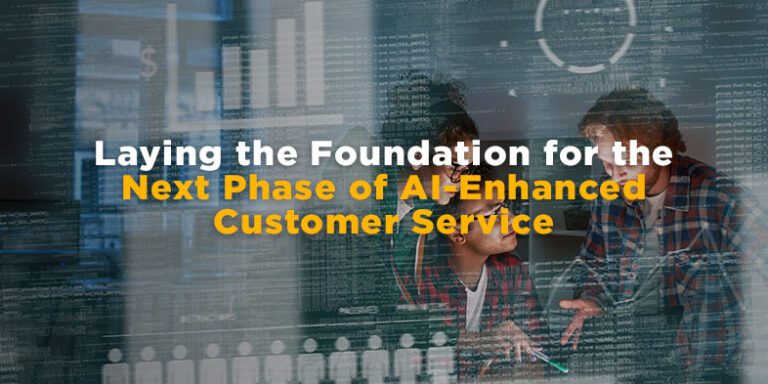Laying the Foundation for the Next Phase of AI-Enhanced Customer Service


As part of Solutions Review’s Contributed Content Series—a collection of contributed articles written by our enterprise tech thought leader community—Krishna Raj Raja, the CEO at SupportLogic, explains how generative, predictive, and conversational AI technologies are helping lay the foundation for the future of AI-enhanced customer service.
 When it comes to customer support, not all AI tools are created equal. Early-model conversational chatbots fall short, often confusing customers and adding to support agents’ workload instead of assisting. And while newer AI boosts efficiency, it’s incapable of truly replicating the human touch essential for complex use cases.
When it comes to customer support, not all AI tools are created equal. Early-model conversational chatbots fall short, often confusing customers and adding to support agents’ workload instead of assisting. And while newer AI boosts efficiency, it’s incapable of truly replicating the human touch essential for complex use cases.
The Rise of Interactive AI
The next phase of AI-enhanced customer service blends generative, predictive, and conversational AI tools to create a more “interactive“ model, which, alongside human expertise, will redefine customer support. These initiatives are designed to:
- Interact with humans and other AI systems dynamically.
- Use natural language processing (NLP) and generative abilities to create responses that mimic human conversation. We’ve already seen what this combination looks like in useful tools like ChatGPT.
- Integrate machine learning (ML) and predictive analytics for higher adaptability and insights.
This integration promises to make AI-enhanced customer service more responsive and customer-centric than ever. But before we can unlock the full potential of future AI interactivity, we must understand the unique roles and strengths of each of these components and how they’re currently backing support teams.
Conversational AI
First-generation tools like Siri and Alexa can mimic human-like conversations and produce quick answers, but they’re severely limited in the rule-based info they can generate. Reflecting on the limitations, Microsoft’s CEO aptly described them as “dumb as a rock.”
Generative AI
This AI relies on raw data to generate new informative content but needs NLP techniques to make it communicative and context-aware. It has proven invaluable to customer support teams by handling cases requiring quick, relevant responses to customer inquiries.
Predictive AI
By analyzing large data sets, predictive AI can anticipate customer needs and forecast future events, trends, and outcomes. With this foresight, human agents receive alerts about potential problem areas, and their proactivity will improve customer engagement.
As AI advances to a more interactive phase, it’s shifting how service inquiries are handled by taking early-AI virtual assistants a leap forward, becoming intelligent virtual agents that aid support teams in elevating service.
Unlocking the Customer Voice
AI’s biggest advantage to customer support is the capacity to surface and amplify the customer’s voice. Customer support has traditionally relied on feedback from past interactions to assess customer sentiment and unearth that voice, but it’s often too little too late.
Proactive support centers on customer sentiment analysis, a hallmark of interactive AI that uses NLP and ML to analyze and interpret customers’ opinions, emotions, and attitudes toward the service they experience. With real-time sentiment analysis, support teams can prioritize and act on cases efficiently based on urgency and emotional intensity.
Generative AI’s Impact on the Support Engineer Experience
With the integration of GenAI, support engineers can effortlessly access answers and summaries, resulting in expedited case handling and an elevated level of service delivery. This generation of AI for support equips agents with valuable insights into customer activity and trends without requiring manual report creation. By embracing these advanced AI techniques, businesses can not only elevate the support engineer’s experience and retention rates but also reduce training time and maintain agility in the face of economic fluctuations.
GenAI is paving the way for a more interactive AI experience. These generative AI tools offer essential insights and personalization, enhancing customer relationships, aiding agent decisions, and surpassing competitors dependent on manual processes, elevating the overall user experience while leading the charge for future AI variations and abilities.
Supporting Human Interaction
There’s no question: AI is enhancing customer support. Regardless of its upgrades, it still has to be backed by human oversight. In the broader context of your business, customer support is not just about resolving support tickets. Customer support’s role is to create meaningful interactions that solve issues, enhance service experience, and drive brand loyalty. AI, in its many forms and upcoming improvements, is helping teams foster more meaningful interactions than they could achieve independently. And that is the real strength of AI—it goes beyond efficiency and cost-cutting. It’s enhancing human ability and intelligence that technology cannot capture or replicate.
The Next Phase of AI
The full breadth of interactive AI is still being fleshed out. One thing is sure: its momentum is full steam ahead, taking customer support to another level by enriching the customer and agent experience. Embracing this technology is not just a trend but a necessity for companies looking to stay competitive in the digital age.





















